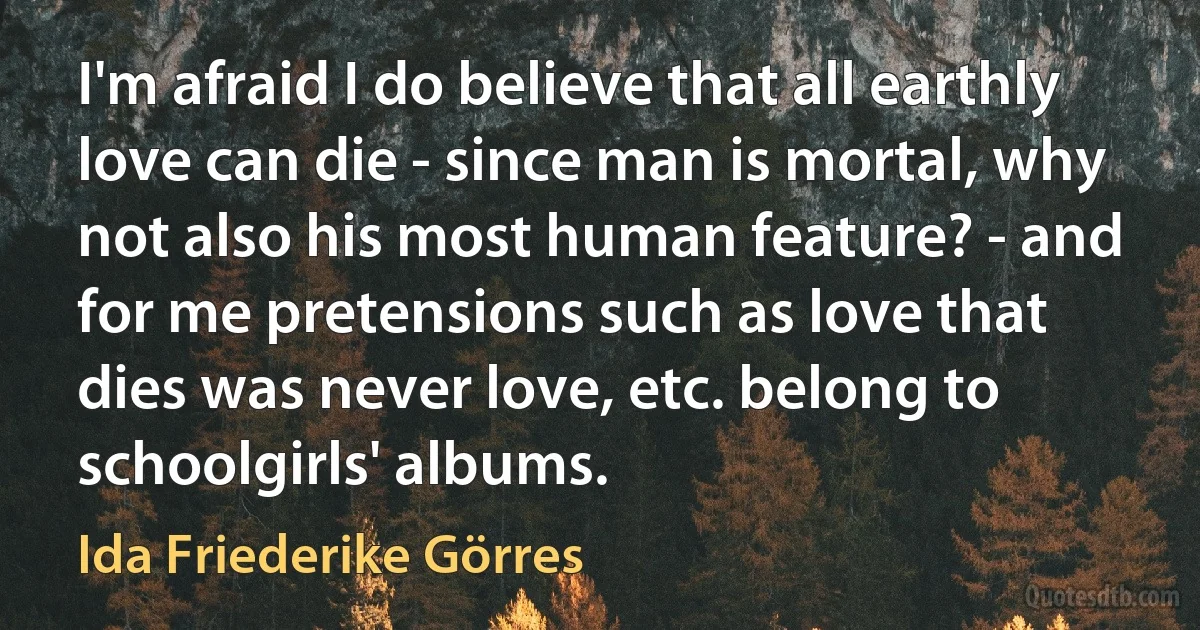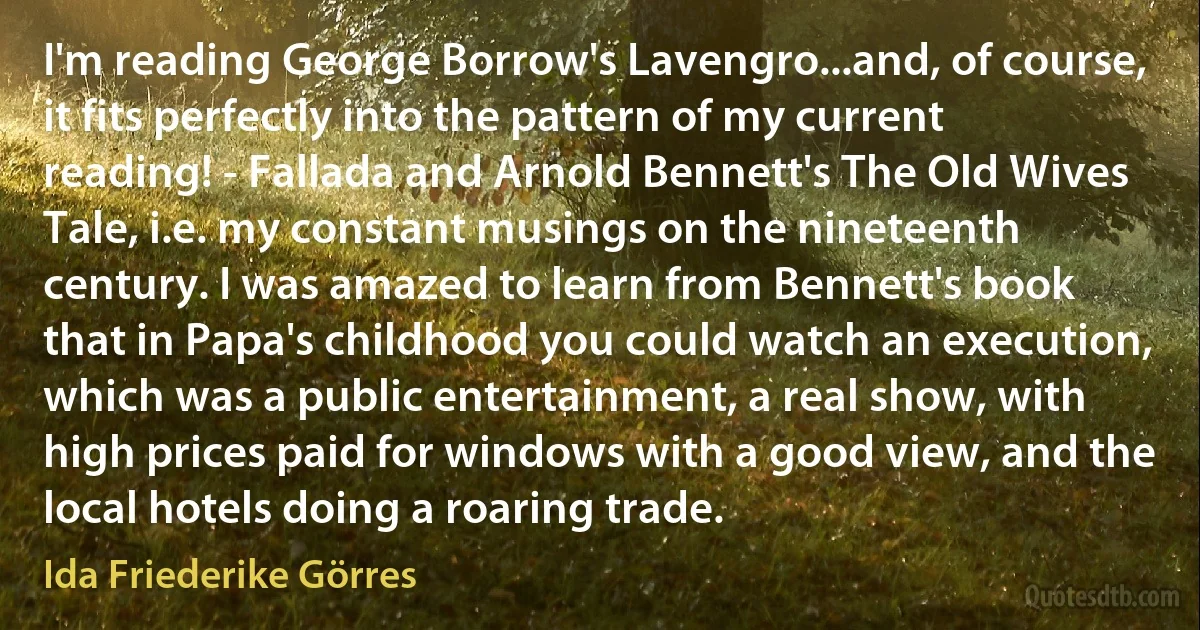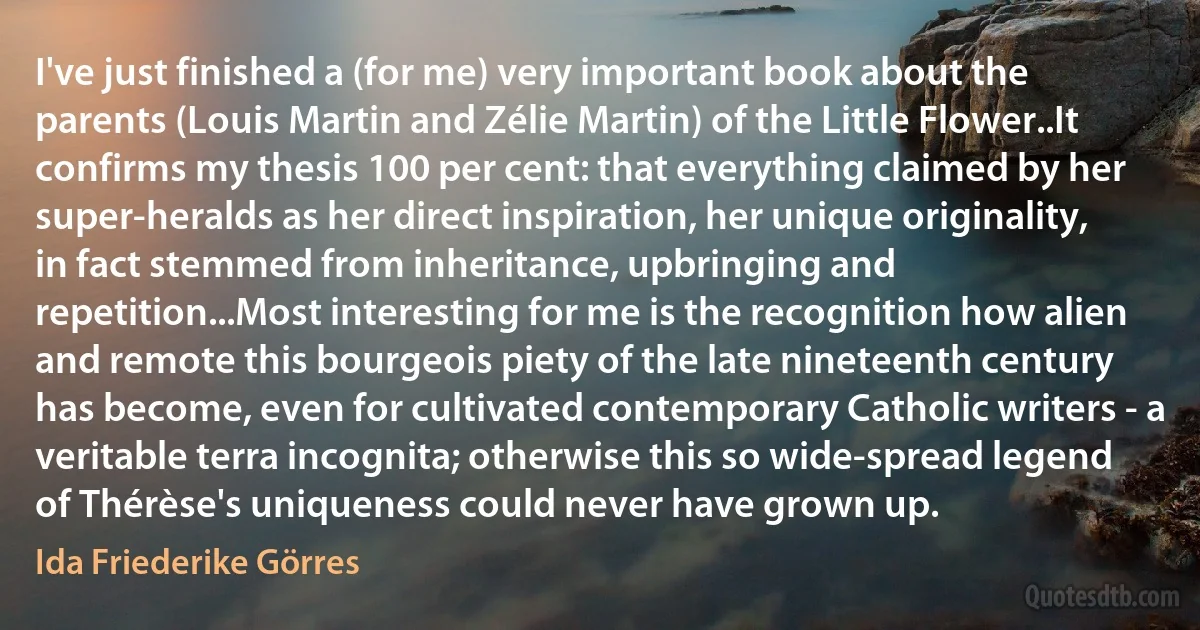Ida Friederike Görres quotes - page 2
Larion's Law by Peter Freuchen. An Indian saga written by a Dane who lived for thirty years among the woodland tribes of Alaska and even had an Eskimo wife... Really one is ashamed to belong to a white race... what we did to Indians, Negroes, Australian aborigines (not even out of political fanaticism either, but as a matter of course, en passant)

Ida Friederike Görres
the protective, healing silence of forgiveness is just as much part of confession as its quality of judgment - stressed so much more. For in confession sin is not so much subjected to the light of the word, of judicial sentence, as received into the darkness of merciful, secret acceptance, sunk into divine oblivion.

Ida Friederike Görres
The close affinity between sexual Eros and deceit is very startling - as in infatuation, infidelity and jealousy: " Quoniam lumbi mei repleti sunt illusionibus. " For, isolated, Eros is in every sense the most treacherous counterfeit of love, sending a continual flow of self-deception and delusion throughout the world, etc.

Ida Friederike Görres
genuine continence and virginity are rare and costly achievements - admirable and really extraordinary; the real thing, nota bene, not simply a shrivelling of Eros-power by means of life-long taboo injections. The Ancients knew this - they called chastity, honestly, simply and humbly, a gift, a charisma, to be implored from God with tears and in humiliating experience - not just a simple athletic feat of will-power and self-control.

Ida Friederike Görres
There's no redder rag for our modern, progressive Catholics than a certain religious approach to sex and Eros ranging from suspicion to open condemnation and branded accordingly as Manichean, neo-Platonic, Puritan, etc. Quite unacceptable. And yet in these quite obviously heretical speculations there's a barb which, even at first encounter, penetrated to the depths of my mind as the startling confirmation of something always known, and this ferment keeps on working - all the time...the idea which one finds in so many apocryphal trends of thought, i. e. that there's definitely something wrong with sex in its present form, that is, during this terrestrial aeon - something that is not sex in itself, as a whole, but some trait or quality.. Something which does not belong to original human nature, but which owes its actual existence to The Fall; in the same sense unnatural as death is unnatural and yet taken for granted, an inevitable, undeniable factor - in this fallen world.

Ida Friederike Görres
I've just finished reading Shakespeare's Sonnets, that is, I've read and understood them for the first time. One passionate, desolate lament - immeasurable and inconsolable - for the waning, wasting and passing of beauty. At the same time there's something disturbingly un-Christian here - the utterly heathen, desperate keening of the dirges, the grisly dances of death, danses macabres, in which death is nothing but the end, finality - destruction, not transition.

Ida Friederike Görres
I've come to the end of von Hügel's voluminous work on Catherine of Genoa. For such outlay in erudition, it's basically an unrewarding book (for me!), but full of interesting side-lights...Curious, for instance, that Catherine, always universally cited as the recognised authority, the most important and competent witness to the nature of Purgatory, should actually never have had a vision of it - neither as shewing nor as visiting in spirit, as other mystics did..Her statements are pure conclusions, analogies, based on her own spiritual experiences of suffering and bliss: "So that's what it must be like in Purgatory!"

Ida Friederike Görres
people run away from burdens these days. There's nothing they hate more than to be burdened or tied. This accounts for this perverse cult of youthfulness: youth is in itself the yet unburdened state - so we worship youthful looks as the sign and symbol of that craving, almost the promise of its fulfilment. But to attempt to keep it for ever only leads to sterility in every sense: monstrous perversion of youth, destined as blossom of the fruit...

Ida Friederike Görres
Been reading Hardy's Return of the Native. Astonishing how moral standards have shifted over the past hundred years:shifted isn't the word - a landslide...Today the problems of these nineteenth-century novels strike us as exaggerated, as bathos, even comical - much ado about nothing. But for these people it really was a struggle with the gods, very real, menacing, dangerous gods.

Ida Friederike Görres
Reading O'Rahilly's life of Father William Doyle. I'm surprised this book hasn't left a deeper mark, for it contains - often in parallel terms - the whole teaching of the Little Way which created such a stir in the case of Thérèse. But it seems people prefer to accept such things from a lovely young girl complete with smile, roses and veil. One can't help wondering whether Thérèse would have met with the same enormous response had she been hopelessly ugly - a hunchback with a squint, or old...

Ida Friederike Görres
Legenda Aurea. To think that there's no Catholic edition of this most Catholic book!...Richard Benz sees it as epic and myth of the Middle Ages, exact parallel to the Gothic cathedrals. Sunk into oblivion with the epoch, rediscovered through the history of art, in the countless painters inspired by the Legend. Wonderful, costly and beautiful - but belonging utterly to the past, monument, museum: venerable, interesting, imposing - tout à fait passé.

Ida Friederike Görres
Life of Paul of the Cross, founder of the Passionists. Astonishing really that he should be so little known, should have left so little impression..Strangely thrilling that St Paul - end of the eighteenth century! - should have prayed all his life for the conversion of England, pledging his sons to do likewise. Once, during Mass, he had a vision of my sons in England. But only in 1841, almost seventy years after his death, did they actually set foot on English soil - through Fr Dominic Barberi. It was he who received Newman into the Church..

Ida Friederike Görres
St Thomas had lots to say about the mystical quality of createdness. For him the creature is truly a mystery, a mystical reality. Sometimes this strikes me so forcibly that I shrink from crushing a gnat or plucking a blade of grass - how dare one do such a thing, except of necessity? Nothing sentimental about this - not even compassion at having to hurt things - simply awe before their Maker. I'd never dare to tear up someone else's sketch or manuscript without first asking the author's permission - unless, of course, he had asked me to do so.

Ida Friederike Görres
Trochu's Vianney book makes me shudder. Positively frightening - and the saint too. The first time I read it I was quite horrified...Actually he is a second Simeon Stylites - and how hard and stern he is - and not only against himself: he would excommunicate his parishioners if they even once went dancing or drinking - like the most rigorous Puritan..For him sin involved personal, direct single combat with Satan...But there's no glove to Vianney's peasant fist. He's really gruesome.

Ida Friederike Görres
I'm reading Kristin Lavransdatter again - it's one of the greatest poetic books, and the most powerful portrayal of medieval Christendom I know....I must admit that it makes me cry every time - because it's so real, so true, reaching to the depths of human nature, touching one to the quick.

Ida Friederike Görres
Léon Bloy, despite his many impressive qualities..what a hater he was! - wild and implacable, and what power of abuse! Strange don't you think that Ernst Jünger should comment at length in his war-diaries how irresistibly Bloy reminded him of Hitler in his paroxysms of rage and his foul and ribald tongue?..Yet Bloy was undoubtedly a man with great gifts of vision and perception, and charity, too - even in the midst of his orgies of hatred. And much of what he writes about Our Lady of La Salette in his La Salette book is very fine and often goes straight to one's heart...

Ida Friederike Görres
Yet again - visible and invisible. The panic of loneliness - not physical, far more moral - arises from the fact that every lonely person is wearing a tarnkappe, a magic hood, (in German fairy tales, a magic cap which makes the wearer invisible) against his will: which is tantamount to saying: "If people don't bother about me, it's because nobody is seeing me - seeing me. I'm just a piece of furniture in their eyes." ... Newcomers in a strange world suffer this fate especially, what's more in a doubly unpleasant way: first because no one takes any notice of them since they don't belong, i.e. they're nobodies, yet at the same time they're conspicuous, in the way, a nuisance, desperately conscious of being just awkward lumps of furniture.

Ida Friederike Görres
For his Spiritual Church Joachim of Fiore foresaw the continuance of the Papacy (much modified), but the bishops were to disappear. If I think at all of the Church to come, then I hope and pray above all for a revival, indeed resurrection of the episcopal office. To my mind it is still a prisoner of its almost thousand-year long disastrous fusion with temporal power. Strange - only a few years ago I thought the Emperor Otto I just marvellous and was full of admiration for his genius in raising the bishops to Reichsfürsten - princes of the realm - thus securing an unshakeable foundation for his Empire. Politically it was a brilliant decision...Yet I can imagine no way in which a mortal enemy of the Church in all craft and cunning could have fastened a worse fate upon her...For how often was their charismatic office as pastors overshadowed, indeed frequently rendered impossible, by their temporal mission and worldly achievements..

Ida Friederike Görres
I'm reading a very quaint American book, The Power of Positive Thinking, written, I'd suppose, by a sectarian minister, presumably of Methodist dye. (Norman Vincent Peale)..He's full of stories of prayers heard - and extols the power of prayer.."Before leaving for an important business conference I brace myself with texts like 'If God be for us, who can be against us?'...Then I stalk into the conference room, sure of my victory, and carry off the most marvellous deal.." This, in essence is the burden of the whole book. That's what people call Christian optimism. But it's wasted on us - we've been spoilt for this sort of thing...But isn't it rather self suggestion than authentic religious impulse? It doesn't seem to have dawned on him that suffering, disappointment, defeat or loss might also have some point too, or that God's designs could sometimes be hidden...

Ida Friederike Görres
I'm reading a biography of St John Baptist de la Salle - Extraordinary what educational insights and experiments have existed already - and what has been forgotten!. That reformatory, for instance, which he founded on the most amazing principles somewhere around 1680...The young delinquents were detained in solitary confinement to begin with, being promoted later..to community life..But in their single cells they were given flowers and plants to cultivate and singing birds to breed! The prisoners took their meals together with the Brothers, and each of the boys in solitary confinement was entrusted to one particular Brother...The Jansenists were bitter opponents of the Brothers, for in all his schools de la Salle laid great stress on frequent Communion..They did their best to oppose him personally and to hinder his work. The French Revolution wrecked his Institute, some of the Brothers were executed, others emigrated.

Ida Friederike Görres
I'm reading Günther Anders' Die Antiquiertheit des Menschen (The Antiquity of Man)..That bit about Promethean shame impressed me..observations about the shame of being oneself, the reluctance at stepping out of line, of being forward, of being looked at. This is entirely true to life...Yet it's just as natural to man to want to be seen, to want to be outstanding, to be regarded, as to want to hide - and both these instincts - for that's what they are - clash, often with equal force...How clearly I see the Little Flower in this light: from earliest days the focal point for her whole family, yet on the other hand sincerely desiring to be hidden, taking the veil - and so wonderfully unveiled to posterity, revealed to the world, set up as an image, i.e. to be looked at!

Ida Friederike Görres
another article by Karl Rahner in Geist und Leben - What he reveals is an issue of the utmost importance: how essential it is for the Christian to recognize a plural, numinous universe, made up of angels, saints, the dead and demons - which are not the same as God...that if this created numinous plurality ceases to be understood as a reality, the very concept of God will be disfigured and distorted..to deny all such powers and figures is just as false, just as ominous as to succomb to them.

Ida Friederike Görres
Ida Friederike Görres
Occupation: Austrian WriterBorn: December 2, 1901
Died: May 15, 1971
Quotes count: 50
Wikipedia: Ida Friederike Görres



